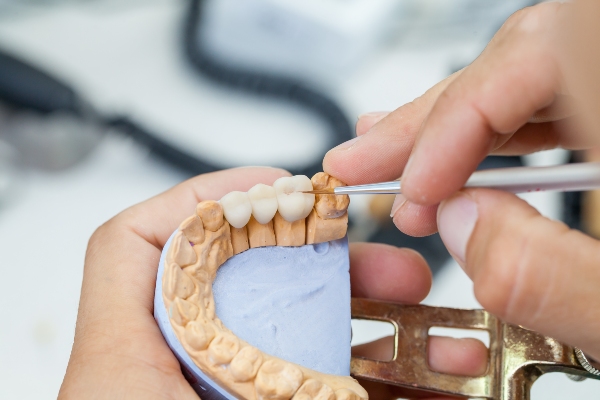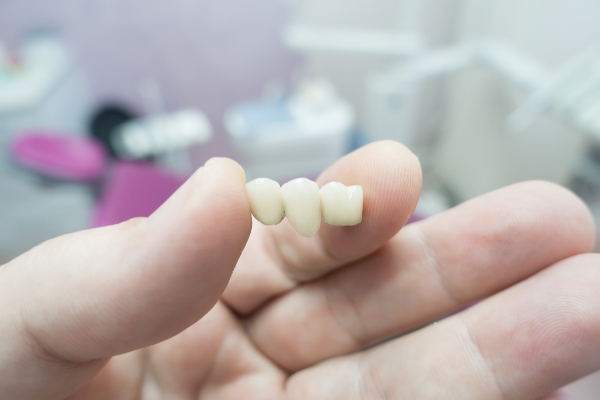What Is a Dental Implant Prosthetic?

If you are reading this article, perhaps your dentist recently mentioned that you might need a dental implant prosthetic. This phrase may sound a bit intimidating at first, but rest assured that it is a simple and common solution to many different dental health and cosmetic issues.
Introduction to dental prosthetics
Whether you know it or not, chances are that you have encountered someone who has a prosthetic at some point in your life. In most cases, the term is used to refer to a limb replacement, usually an arm or a leg. Roughly two million Americans have a prosthetic limb, so in most cases, people think of a major body part when they hear the term.
When it comes to dental implants, however, a prosthetic refers to an artificial tooth. By definition, a prosthetic is an artificial part of the body, and when you are discussing a dental implant prosthetic, you are referring to two different parts, the metal insert that connects to the jawbone and the actual tooth itself.
Titanium is tops
In most cases, the metal that a dentist inserts into your jawbone when you are getting a dental implant will be made of titanium oxide. Titanium is the preferred metal for two main reasons: It is a strong metal that provides durable support for your implants, and it fuses naturally with the jawbone. Unlike other metals, titanium oxide will not corrode inside your mouth or react with bodily fluids. This allows it to form a bond with your jawbone and create a strong base that your implant needs to stay in place.
If you happen to be allergic to titanium, there is still a solution. Zirconia can be used, though it is more prone to cracking than titanium and is typically only used as a last resort.
Porcelain protection
Generally, your dentist will use a porcelain crown to go along with the titanium abutment, and strength is again one of the biggest reasons. Not only does porcelain look and feel like a real tooth, but it is even stronger than a real tooth. One of the biggest benefits to dental implants over dentures is bite quality. While dentures struggle to come anywhere close to the performance of real teeth, dental implants perform on par or even better than real teeth, allowing you to get back to enjoying healthy foods that can protect the rest of your natural teeth!
Am I eligible for a dental implant?
Generally, dental implants are available to anyone who has enough bone density in their jawbone to be able to support the connection between the jawbone and the abutment. If the jawbone is too weak to support a connection, the implant will fail. When you opt for dental implants, your dentist will check your current oral situation to make sure your jawbone can support such a procedure. Your dentist will only proceed if they are sure that your jawbone is able to support the implant, which is one reason that dental implants have such a high success rate.
If you think you would be a good candidate for dental implants, then you should speak to your dentist. Be sure to let them know you would like to learn more about dental implants and how they can help you improve your oral health; your results will be something to smile about!
Let's get started
Request an appointment here: https://brimhalldentalgroup.com or call Brimhall Dental Group at (661) 249-1122 for an appointment in our Bakersfield office.
Check out what others are saying about our services on Yelp: Read our Yelp reviews.
Recent Posts
When the smile is missing a tooth or three, a general dentist may recommend dental bridges to restore its appearance and functionality. Even a single missing tooth can cause difficulties with eating and speaking. It also leaves room for the remaining teeth to shift, leading to a misaligned bite. While traditional and implant-supported dental bridges…
Curious about dental bridges? Read on to learn more about this type of restoration. The aftermath of tooth loss can be a struggle. The loss puts extra pressure on the rest of the teeth and chewing becomes less effective. Your speech gets affected too. Fortunately, dental bridges lay out a path to restoring the look…
A denture repair should be your top priority when your denture breaks or becomes damaged. This prosthetic device fills out all the empty spaces in your mouth. It is crucial to care for your denture since the missing teeth can compromise your eating habits, speech, and appearance. This dental device is durable enough to handle…
Missing teeth can negatively impact your smile's appearance and health. However, there are treatments out there that can help. Dental bridges are a common dental restoration that can improve oral health and enhance your smile. A dental bridge can be an effective solution if you have lost a tooth due to decay, injury, or other…


